Here's my key takeaway from the inaugural AI Engineer Summit this week 👉 everyone's dealing with the same 3 problems.
- Good old fashioned data engineering
- Evals and non-determinism
- Product development
Like I've been saying for months now – AI is the easy part. Grab an API or an open-source model and you have a black-box brain that can do stuff. Easy.
But how do you turn that 2 hour demo into a product? That's the challenge.
Good old fashioned data engineering
Everyone at the conference has built a RAG demo. That's when you take a user's question, retrieve relevant documents, and pass those to the LLM as additional context inside the prompt.
Mine was turning my blog into a chatbot.
Abi Aryan put that as the mid-level of domain adaptation in her deeply technical talk.
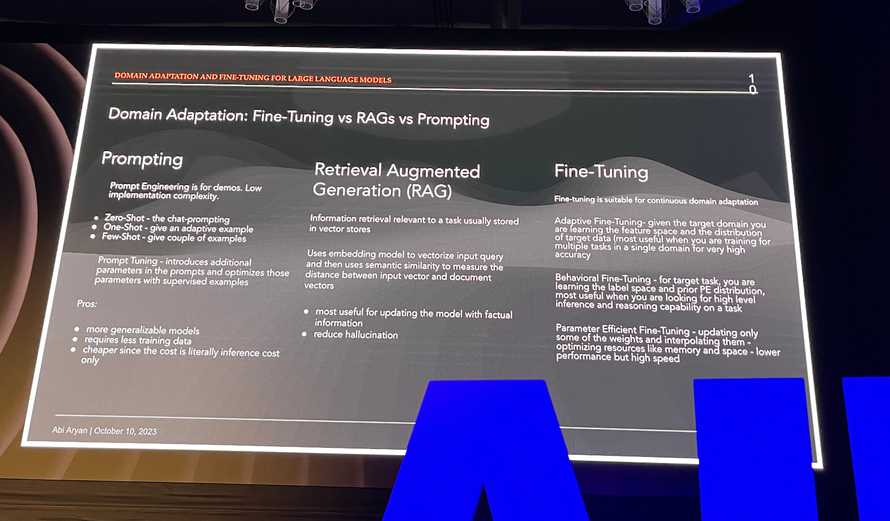
The demo is easy. Now how do you keep documents updated? How do you retrieve the right documents? How do you ensure the LLM doesn't get confused with irrelevant detail? Can you validate it didn't hallucinate despite the context? Did the LLM even read all the documents you sent? Are you sending the right chunks of documents or too much? What if the LLM needs to read a document, think a little, grab another document, and do full-on research before it can answer the question?
Like half the conference sponsors were various vector databases trying to solve those problems. Retrieval is tough.
Jerry Liu's talk on how they think about solving these problems at LlamaIndex was neat. Especially the agents approach where your "database" can do autonomous research across your documents sounded exciting.
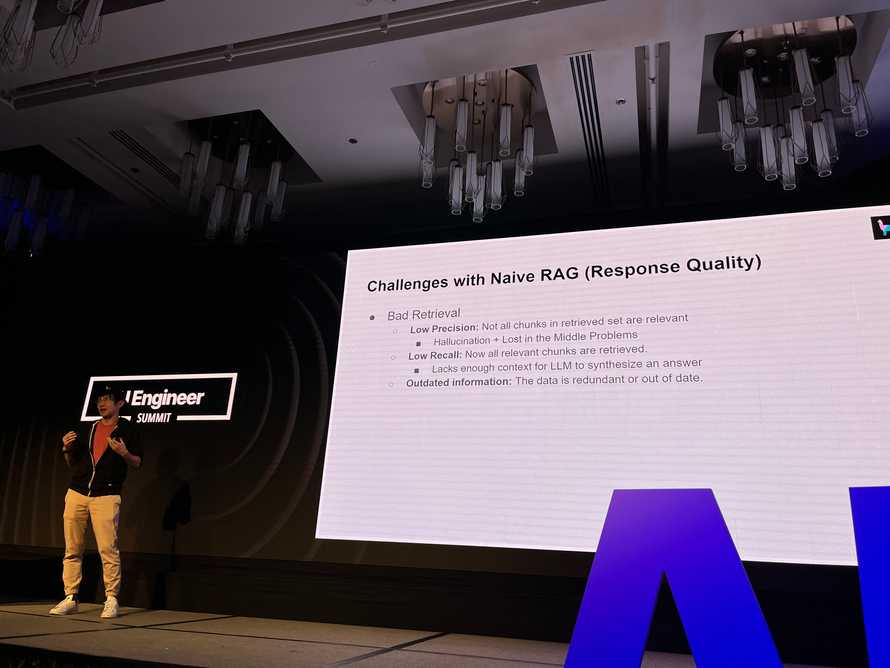
And that's the easy approach!
When you decide it's time to fine-tune a model, you'll need plenty of data. Good clean high quality data. That someone needs to prepare and manage. That's a whole separate field of engineering!
Evals and non-determinism
The hard part of working with AI are non-deterministic outputs. You get a different result every time you run your code.
So how do you know you're making it better?
Several speakers joked about "eyeballing" and "the vibe check", but that's what almost everybody does. You try a few things and say "Yeah that looks about right".
There's two aspects people care about here:
- Did the LLM return a parse-able response (for chaining and such)
- Did the LLM return a good answer (for user output)
Parse-able response?
We saw a couple of demos/approaches around convincing LLMs to respond with structured data.
Jason Liu shared how he uses pydantic to get type-checkable responses from LLMs in Python. With full type annotations and everything! I forgot to take a pic.
Daniel Rosenwasser showed off a new thing Microsoft built – TypeChat. It's like TypeScript but for dealing with LLMs 😍
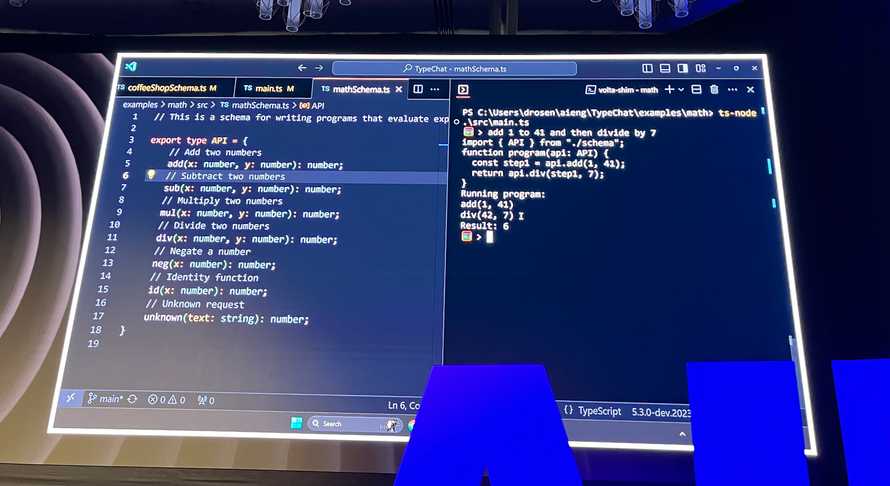
Evals
Even harder than consistently parse-able responses is having an engineering process better than a vibe check. How do you know your code is improving?
That's where evals come in.
Abi put it in a nice MLOps/LLMOps pipeline for us:
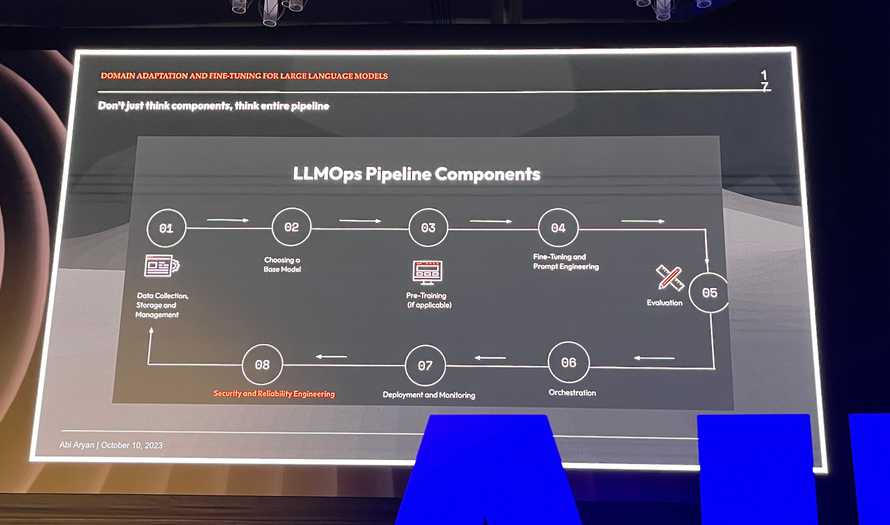
Evals are like integration tests for your code, but probabilistic. If your code succeeds 30% of the time right now (answers correctly), you want the next iteration to get it right 35% of the time.
Yes you read that correctly: 30%. You can do better than that on some tasks but not all tasks. Depends how strict you are also – if a model answers the question and adds unnecessary fluff, is that a pass or fail?
Evaluation itself is hard. Best we can do right now is to have a pre-defined rubric we check against and a flexible evaluation criteria. Asking a stronger LLM for opinion is common.
Shreya Rajpal is working on extending evals into pipeline building blocks with Guardrails AI.
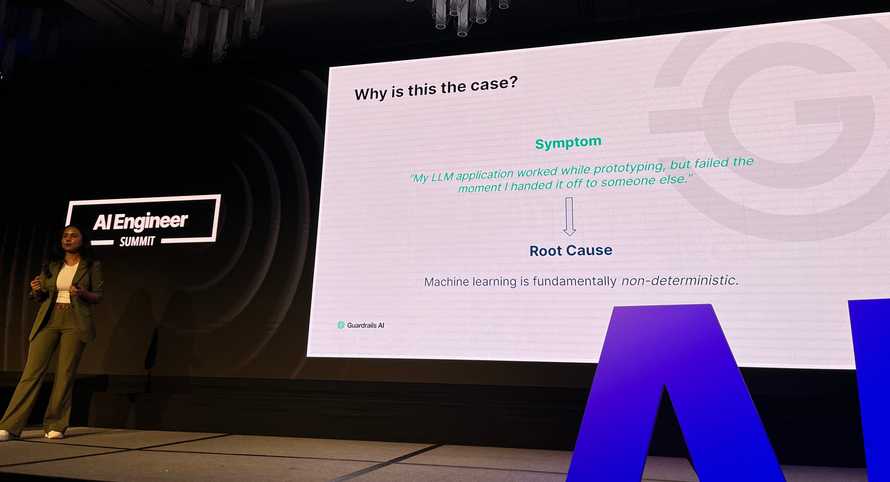
That's not the best photo but I loved her idea that you can
- Run your LLM thing
- Eval the response
- Re-run until eval passes or you give up
Good for productizing! Wouldn't want your milkshake AI to go on a rant about almond milk.
Product development
There is no AI moat because AI is the easy part.
That means your product needs to win the old fashioned way:
- Find a niche
- Solve the problem
- Good UX
- Gather feedback
- Iterate
- Win the marketing game
Eventually you'll hit a wall with off-the-shelf models and APIs and will need to fine-tune or build custom models to keep improving. At that point you'll need shitloads of data and user feedback. The big companies you're competing against already have that.
As Hassan said: I spend 80% of my time on UI.
“I actually spend 80% of my time on UI even though these are AI projects” #aiesummit pic.twitter.com/uWD3Vf2d5z
— Swizec Teller (@Swizec) October 10, 2023
Cheers,
~Swizec
Continue reading about AI Engineer Summit report
Semantically similar articles hand-picked by GPT-4
- Eight things to know about LLMs
- How to start playing with generative AI
- Reader question: Should you learn the latest hotness?
- What does "solve problems" even mean
- Programming in Markdown
Learned something new?
Read more Software Engineering Lessons from Production
I write articles with real insight into the career and skills of a modern software engineer. "Raw and honest from the heart!" as one reader described them. Fueled by lessons learned over 20 years of building production code for side-projects, small businesses, and hyper growth startups. Both successful and not.
Subscribe below 👇
Software Engineering Lessons from Production
Join Swizec's Newsletter and get insightful emails 💌 on mindsets, tactics, and technical skills for your career. Real lessons from building production software. No bullshit.
"Man, love your simple writing! Yours is the only newsletter I open and only blog that I give a fuck to read & scroll till the end. And wow always take away lessons with me. Inspiring! And very relatable. 👌"
Have a burning question that you think I can answer? Hit me up on twitter and I'll do my best.
Who am I and who do I help? I'm Swizec Teller and I turn coders into engineers with "Raw and honest from the heart!" writing. No bullshit. Real insights into the career and skills of a modern software engineer.
Want to become a true senior engineer? Take ownership, have autonomy, and be a force multiplier on your team. The Senior Engineer Mindset ebook can help 👉 swizec.com/senior-mindset. These are the shifts in mindset that unlocked my career.
Curious about Serverless and the modern backend? Check out Serverless Handbook, for frontend engineers 👉 ServerlessHandbook.dev
Want to Stop copy pasting D3 examples and create data visualizations of your own? Learn how to build scalable dataviz React components your whole team can understand with React for Data Visualization
Want to get my best emails on JavaScript, React, Serverless, Fullstack Web, or Indie Hacking? Check out swizec.com/collections
Did someone amazing share this letter with you? Wonderful! You can sign up for my weekly letters for software engineers on their path to greatness, here: swizec.com/blog
Want to brush up on your modern JavaScript syntax? Check out my interactive cheatsheet: es6cheatsheet.com
By the way, just in case no one has told you it yet today: I love and appreciate you for who you are ❤️
